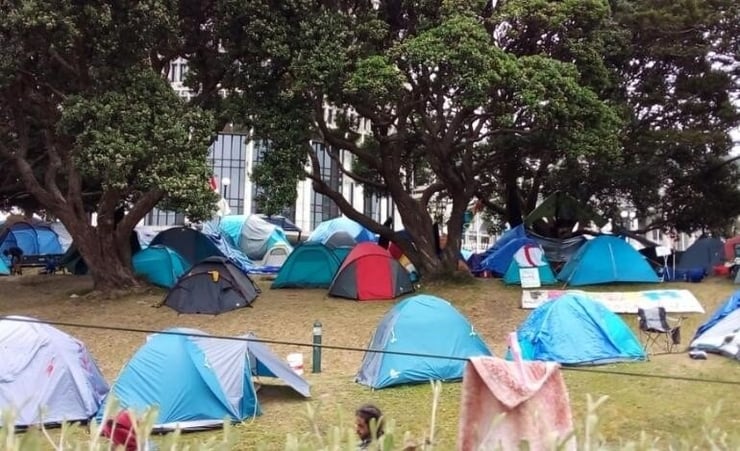Once the toast of nations, NZ's pandemic management is unravelling

“The protesters are trashing the toilets. They must buy rail tickets to use them,” grumbled the orange-vested security staff busy barricading the platforms at the train station in Wellington. Over at the tented protest campsite on the Parliament grounds close by, an uneasy calm prevails following skirmishes with the police.
The anti-vaccine mandate protesters, occupying the site for the past three weeks, are preparing to lock arms around the protest perimeter on Monday, February 28, in a show of solidarity. Clearly, they are there for the long haul.
“We are not going anywhere,” says Vincent Banks 36, who lost his job as a loader with Air New Zealand at the Auckland International Airport for failing the government’s vaccination mandate.
The setting is not media-friendly. The messaging on placards and walls makes that abundantly clear. The media are liars, screams a poster close to where Banks stands waving a flag. “Who do you represent, mate?” he wants to know before taking queries, and breaks into a smile soon after. “I love Indians,” he beams. “Welcome.”
The cluster of tents on the Parliament lawns is a hub of activity. “We have people from different professions here. Nurses, medics, teachers, electricians, plumbers, the whole lot,” says Rosalla,55, who has eight children and 14 grandchildren.
She recounts how a baby was delivered at the protest camp without medical support from outside. Both mother and child are coping well, she says. Rosalla, who drove down from Hamilton, stays in a tent hitched to her car and is accompanied by two of her cousins.
The ethnic faultlines that underpin the anti-mandate protest seeps into the conversation. “The vaccine mandates have left us a segregated people,” says Rosalla, obviously referring to the Maori community. “We can’t go anywhere without taking the jab.”
Much of the anti-establishment anger is targeted at the police. While a carnival spirit unites the protesters in their sprawling tented camp, the local residents on Bunny Street and other areas surrounding the protest site are clearly nervous. Store owners, fearing vandals, are downing shutters earlier than usual. The owner of a Japanese sushi outlet told Indian Weekender that she decided to close early after she witnessed unruly protesters walking into shops and breaking things.
Motels are letting in protesters as guests but only if they present vaccine passes. This means the protest is nuanced. At its core are the diehard anti-vaxxers who refuse to take the jab. At its periphery are those who are not opposed to the vaccination regime but are against the government’s claustrophobic vaccine mandates. Most simply want to get back to work. Karioi,17, a fruit picker from Hamilton who supports his family of eight siblings and solo mum, wants the government to ease up on its mandates and bring closure to families struggling to cope.
But with Covid-19 cases on the rise, the anti-mandate protest is at risk of being tagged as a super spreader event.
While hotheads among the ranks of the protesters continue to engage the police, there is growing concern that a deadly cocktail of aggressive behaviour, poor sanitary conditions, the spread of Covid 19 and the increasing number of people falling sick is turning the Parliament precincts into what the police have described as an “unsafe and unpleasant environment.”
The police are also concerned that “key protest group leaders are unable to control or influence the disparate groups within the protest,” as per an update released by the police.
The police estimate there are around 300 vehicles inside the cordoned area as of Sunday, February 28. The threat of towing and impounding illegally parked vehicles remains only partially implemented.
With Parliament set to meet next week, Prime Minister Jacinda Ardern will be under pressure to resolve the ongoing crisis to the satisfaction of the key stakeholders: the government, the protesters and the wider community. That will not be easy, given the overlapping interests of the key constituents.
Easing the vaccine mandates will look like capitulating to the protesters. Holding out could prolong the protest and encourage the opposition to fish in troubled waters. It could also weaken the prime minister within her party.
Instead, Ardern might opt to appeal to the wider community and step up the messaging on public health and safety, while incrementally loosening the government’s strict vaccine mandates.
Whatever the course she adopts in the days or weeks ahead, Jacinda Ardern’s pandemic management, that made her the toast among nations, appears to be unravelling as fast as the pandemic is spreading.




